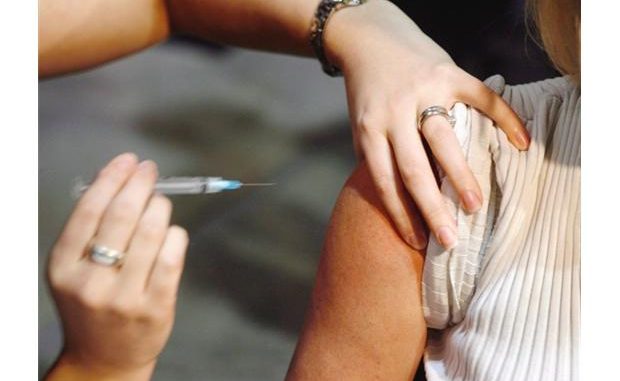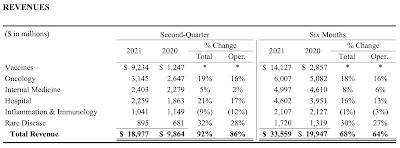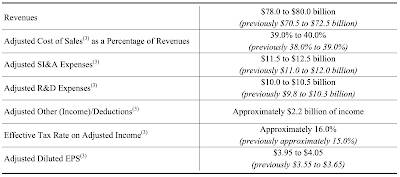
Pfizer recently released its second quarter of 2021 results and, not surprisingly, they were nothing short of fantastic for shareholders and corner office dwellers alike.
Sales revenues for the second quarter of 2021 were $19.0 billion, reflecting 86 percent operational growth and 92 percent revenue growth. When the company's COVID-19 vaccine, BNT162b2, is excluded, sales revenues rose by a much more modest 10 percent. These results were so fantastic, that Pfizer raised its full-year guidance for retunes to a range of $78 billion to $80 billion from a range of between $70.5 billion and $72.5 billion. Earnings per share also increased of to a range of $3.95 to $4.05 both including and excluding BNT162b2.
Here is a table showing the overall results for the second quarter of 2021 as well as the first and second quarter of 2021 combined compared the previous year:
Note that net income for the latest quarter is up 59 percent on a year-over-year basis, rising from $3.489 billion to $5.563 billion.
Here is a table that further breaks down Pfizer's revenues over the same periods of time:
You will notice that, in the second quarter of 2021, revenues from vaccines accounted for 48.7 percent of Pfizer's revenues, up from 12.6 percent in the second quarter of 2021. Pfizer's revenues from vaccines rose from $1.247 billion in the second quarter of 2020 to $9.234 billion in the second quarter of 2021, an increase of 640 percent and over the first and second quarters, vaccine revenues rose to $14.127 billion.
Since Pfizer's bottom line is heavily dependent on its COVID-19 vaccine, let's look at the updated assumptions relating to BNT162b2 within the company's guidance:
Here is Pfizer's latest 2021 guidance showing the impact of BNT162b2 on the company's financial health:
Please note that sales projections for the company's COVID-19 vaccine has increased from $26 billion in the first quarter of 2021 to its new target of approximately $33.5 billion.
Without BNT162b2, Pfizer's guidance shows that the company's projected increase in revenue growth is far more modest:
Since Pfizer's bottom line is heavily dependent on its COVID-19 vaccine, let's look at the updated assumptions relating to BNT162b2 within the company's guidance:
Pfizer's projections for BNT162b2 include 2.1 billion doses that are expected to be deliver in 2021 under contracts signed through to the middle of July 2021. Based on current projects, Fizer expects to manufacture a total of up to 3 billion doses by the end of December 2021. It is also interested to note that second quarter 2021 R&D expenses increased a rather small 17 percent operationally on a yea-rover-year basis which includes incremental investments across multiple therapeutic categories including addition expenses related to the development of BNT162b2.
In looking through the entire document, what I found particularly interesting is the effective tax rate on the company's reports income. For the six months of 2021, Pfizer projects a 15 percent tax rate on reported income, up from 13.3 percent on a year-over-year basis.
On a forward looking basis, Pfizer projects the following for its BNT162b2 vaccine program with bolds being mine:
1.) In June 2021, Pfizer and BioNTech initiated a Phase 2/3 study to further evaluate the safety, tolerability and immunogenicity of BNT162b2 in preventing COVID-19 in healthy children between the ages of 6 months to 11 years old. The companies expect to have the safety and immunogenicity data that could potentially support an Emergency Use Authorization (EUA) for use in children ages 5 to 11 years old, if such an EUA is deemed necessary, by the end of September. The full dataset from this study, which will be required to support licensure in thisage group, is expected by the end of 2021. Similar data packages will be submitted shortly thereafter to support EUA and licensure in children 6 months to 5 years of age.
2.) In July 2021, Pfizer and BioNTech provided an update on the ongoing Phase 1/2/3 booster trial of a third dose of the current BNT162b2 vaccine. Initial safety and immunogenicity data from the study demonstrate that a booster dose given at least 6 months after the second dose has a consistent tolerability profile while eliciting high neutralization titers against the wild type and the Beta (B.1.351) variant, which are 5 to 10 times higher than after two primary doses. In addition, newly disclosed data demonstrates that a third dose elicits neutralizing titers against the Delta (B.1.617.2) variant that are more than five times higher in younger people and more than 11 times higher in older people than after two doses. The companies expect to publish more definitive data about the analysis and all accumulated data will be shared as part of the ongoing discussions with the FDA, EMA and other regulatory authorities in the coming weeks.
3.) In July 2021, Pfizer and BioNTech initiated the global Phase 3 portion of the clinical study to evaluate the efficacy, safety and tolerability of a third dose of BNT162b2 compared to placebo, including evaluating the booster’s efficacy at continuing to prevent COVID-19 infection. The Phase 3 study will enroll 10,000 participants who participated in the original Phase 3 trial.
After all, how is Pfizer supposed to increase its profitability without injecting young children between the ages of 6 months and 11 years with its experimental vaccine that has not yet finished Phase 2/3 trials? Those hundreds of millions of young children will join participants in Pfizer's Phase 3 trial which will examine the safety of a third dose (the booster dose) of BNT162b2
It is clear that, thanks to the COVID-19 pandemic, Pfizer has become a company that is heavily reliant on its experimental COVID-19 vaccine for its profitability. While there was relatively modest revenue growth in the company's other product lines, they pale in comparison to the growth in revenue and profitability delivered mainly by the BNT162b2 vaccine. As well, thanks to the generosity of taxpayers around the world, not only are we ultimately paying for an experimental vaccine, we have also completely absolved Pfizer from any costs of advertising their COVID-19 vaccine not to mention any liability that may result from vaccination with BNT162b2, the costs of which will also ultimately be borne by taxpayers.
You can publish this article on your website as long as you provide a link back to this page.







Be the first to comment